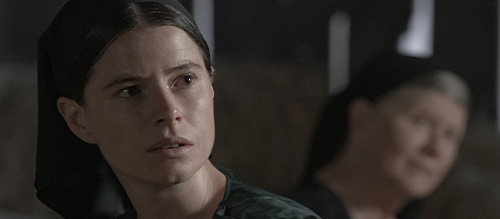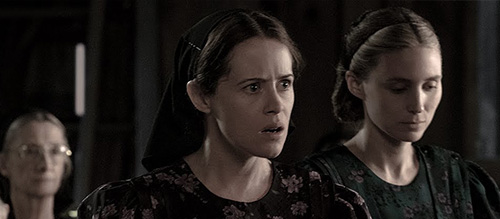Women Talking (2022) Review

Women Talking (2022)
Director: Sarah Polley
Screenwriters: Sarah Polley, Miriam Toews
Starring: Rooney Mara, Claire Foy, Jessie Buckley, Judith Ivey, Kate Hallett, Sheila McCarthy, Liv McNeil, Michelle McLeod, August Winter, Frances McDormand
It has been a little over five years since the #MeToo movement uncovered a devastating network of abuse within the film industry and beyond, and Hollywood is still reckoning with the fallout on screen. Some films, like Maria Schrader’s She Said chronicle the real-life devastation of coming forward with sexual assault allegations while others like Luckiest Girl Alive process the trauma in a fictional realm. Either way, it has become necessary and essential to unpack the harm of sexual assault and the social ramifications of confronting it.
Sarah Polley’s Women Talking is an entanglement of all these complexities. Though the film is an “act of female imagination”, according to its title card, it is partially based on a true horror story. According to an article by Marie-Claire Chappet in Harper’s Bazaar, the film models after the 2005 Manitoba Colony incident known informally as “the ghost rapes” in which Mennonite women and girls were drugged and assaulted by colony elders in their sleep. Even though the victims would wake up with bruises and other injuries, they were convinced that demonic presences haunted them. There were several hundred victims and eight perpetrators were convicted years later.
Women Talking is a quiet, Socratic journey into the physical, mental, and spiritual pain that sexual assault reaks on a community. Our central cast is a fictional elected body of women tasked with deciding the fate of their small Mennonite village after discovering the truth about the attacks. They offer the women of their community three options: they can leave the community, stay and fight, or forgive the men.
We come to the slow realization that no matter what the women choose, they will forever be haunted by their choices. If they forgive, they risk the safety of future generations and communicate weak boundaries. If they leave, they will enter a world they are completely unfamiliar with. If they stay and fight, they break the sacred oath of pacificism that dictates their lives. It’s an impossible choice that the victims must make while the men remain complacent.
Though we don’t see much violence on screen, we can feel it permeating the conversation as the women mourn their community. Some are angry, some are eager to return to life as it was, and some worry about their spiritual well-being – but all of them are scared. It’s a devastating dilemma. Through no fault of their own, the women realize that they will have to destroy the lives they once knew in order to make peace with themselves. All of their relationships – not only with the men – have been broken down by the lapse in trust caused by the attacks. The women are desperate but sometimes unable to empathize with each other as they struggle to cope with the stress, trauma and horror of their situation.

Salome (Claire Foy) is perhaps the most dynamic character. She is deeply vengeful and ready to take the community by force after the assault of her four-year-old daughter. Her reaction is the most extreme out of all the women, but the compassionate storytelling and Foy’s compelling portrayal make us deeply empathetic towards her. On the other end of the spectrum, Agata (Judith Ivey), is an older woman who reminds the counsel that withholding forgiveness is a sin and will be punished in the afterlife.
Polley’s sensitive directing and limited filming locations make the claustrophobia of the situation feel viscerally real. The Mennonite community is incredibly isolated and straying from its strict guidelines is a monstrous endeavor. Over the course of three tense, dialogue-filled days, the conversation is a matter of life or death for these women. They discuss everything from educating future generations of boys about consent to the logistics of surviving outside of the world they’ve always known.
As we continue to understand how the #MeToo movement has impacted our culture, we continue the conversation in film. Sarah Polley’s Oscar-nominated Women Talking empathetically unravels the social dynamics after assault and deals with the introspective and communal aspects of consent. Its philosophical and victim-forward mentality offers a reprieve from a male-dominated space and allows women to heal, process, mourn, and move toward an equal community.
Score: 20/24

